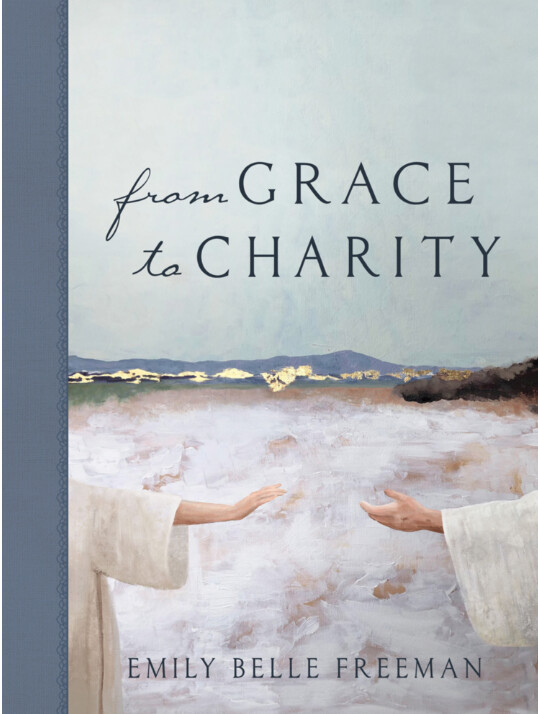It is the Lord who first enters this story. But He isn’t the one who finishes it.
Some might say it began on the road to Damascus, but in reality, it started long before that. It began with a man who got caught up in rules, and law, and scorekeeping. He made himself the judge of who was living right or wrong. It would be such a hard weight to carry. This life of constant judgment led him into the office of the high priest. He walked in breathing out threatenings and slaughter. He asked for a letter condemning anyone who believed in Jesus Christ (see Acts 9:1–2).
He left with what he wanted clutched in his hand.
It’s how Saul began the journey to Damascus. On that afternoon, the light that fell from heaven surrounded a man greatly lacking grace or charity. This was a man bent on persecution. An entitled man filled with one pursuit—to rid the culture of anything that breathed of Christ.
It was all he could do, should do, was meant to do.
This is where Jesus met him. “Saul, Saul, why persecutest thou me?” (Acts 9:4).
“What wilt thou have me to do?” I am impressed with Paul’s response. His humility. His desire to engage with someone he was desperately trying to rid the world of. The answer was simple. “Go into the city, and it shall be told thee what thou must do” (Acts 9:6). And then the light was gone, and Saul was blind, and he was left to the mercy of the followers of Christ.
The ones he had breathed out threatenings and slaughter to.
He was left to their grace.
To their charity.
The building of trust had begun.
“There was a certain disciple at Damascus, named Ananias …” (Acts 9:10).
This is how we are introduced to one of my most favorite people from the New Testament. Ananias. It was the Lord’s second stop to Damascus that day. This time He came with instructions: “Go into the street which is called Straight, and inquire in the house of Judas for one called Saul …: for, behold, he prayeth” (Acts 9:11).
Ananias’s response was immediate. “Lord, I have heard by many of this man, how much evil he hath done to thy saints at Jerusalem: And here he hath authority … to bind all that call on thy name” (Acts 9:13–14).
Do you know who this man is?
Are you sure you want me to go there?
Imagine his surprise when the Lord replied, “Go …: for he is a chosen vessel unto me” (Acts 9:15).
And sometimes we don’t comprehend the meaning of chosen.
I love to imagine the moment those two men stood on either side of a closed door. Ananias on the porch, knowing the man inside could take his life, had taken the life of others he knew and loved. Paul on the threshold, knowing that his blindness prevented him from protecting himself from whatever harm the Saint standing on the other side of the door might do to him.
This is the building of trust.
Do you knock?
Do you open?
Luke tells us that Ananias entered the house, put his hands on Saul’s head, and said, “Brother Saul, the Lord, even Jesus … hath sent me” (Acts 9:17).
Brother.
Of all the names he could have called him, all of the accusations he could have shouted, the word Ananias chose to start with was brother.
Here is outward grace. Here is where the charity began.
In case we didn’t get the full story the first time, Paul repeats it again in Acts 22. I love that he again reminds us of the fact that Ananias calls him “brother” before the healing process even begins. In this chapter, we learn more about the charity. Sometimes loving well comes through words. “God … hath chosen thee,” Ananias begins, “that thou shouldest know his will, and see that Just One, and shouldest hear the voice of his mouth. For thou shalt be his witness unto all men of what thou hast seen and heard. And now why tarriest thou? arise, and be baptized” (Acts 22:14–16).
You are chosen.
God wants you to know His good will for you.
He wants to change your perspective.
He has a great purpose for you.
What are you waiting for?!
It is a way of communicating each of us could learn from. High trust—the language of faith. High expectation—the language of hope. High love—the language of charity. I wonder if anyone has ever spoken to you like this.
Who is your Ananias?
Who is the person who reminds you of your great worth, your great potential, who sees you as God sees you, who keeps you moving forward with the Lord?
It is an important question to consider.
But here is another just as important.
Who is your Saul?
Who needs you to remind them of their great worth? Their potential in the eyes of the Lord? Who needs you to lift and love them closer to Christ right now?
To fully understand this lesson on grace, the beauty of the charity manifest here, we must turn to one more chapter in the New Testament. To the book of Philemon. It has been years since Ananias blessed Paul. Over time Paul has become a great champion for the Lord’s cause. Now he is in prison, still doing the great work of the Lord. He meets a runaway there named Onesimus. The man has left his employment in a dishonest way, leaving his employer, Philemon, in a great bind. Paul encourages Onesimus to go back and ask for forgiveness.
The book we call Philemon is the letter written by Paul and carried in hand by Onesimus back to the man he betrayed.
It is another porch and threshold moment.
Paul has stood in that place before.
In the letter Paul begs Philemon to take back Onesimus. To receive him as if he were Paul. “For love’s sake” (Philemon 1:9). Don’t receive him as a servant, Paul tells him, “but above a servant, a brother beloved, specially to me” (v. 16).
Receive him as a brother.
Brother.
Only Paul could understand how important that first word would be.
“If he hath wronged thee, or oweth thee ought, put that on mine account; … I will repay it. … Yea, brother, let me have joy of thee … having confidence in thy obedience …, knowing that thou wilt also do more than I say” (Philemon 1:18–21).
A brother.
Beloved.
For love’s sake.
Maybe it is through a process of grace and charity that we, too, become the beloved.
Perhaps it is living out the process that teaches us the truth.
Give them grace that they might have charity.
The expression of true charity often comes when the touch of divine grace on our heart is actually reflected in our life.
Outward grace that allows us to meet someone where they are and give them a second chance.
The charity that allows us to call an enemy, brother.
▶ You may also like: Emily Belle Freeman: Grace that glitters down vs. grace that lifts up
From Grace to Charity
What does grace have to do with charity? How does receiving one lead to gaining the other? Scripture tells us that charity is a love that causes us to lay down our lives for someone. A greater love. A love that we must pray to be filled with. The pure love of Christ. What if charity is the outward expression of our inward understanding of grace? It is meeting others where they are, as they are, and then lifting them. It is the way of Christ.



